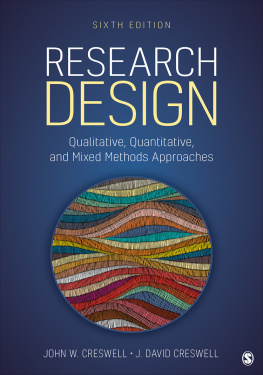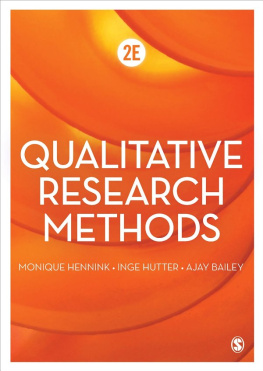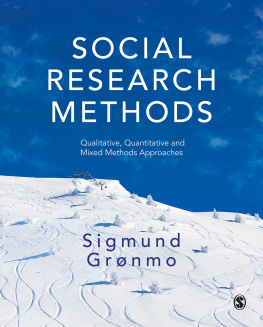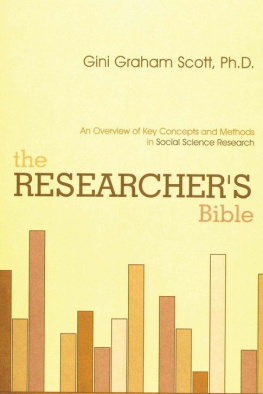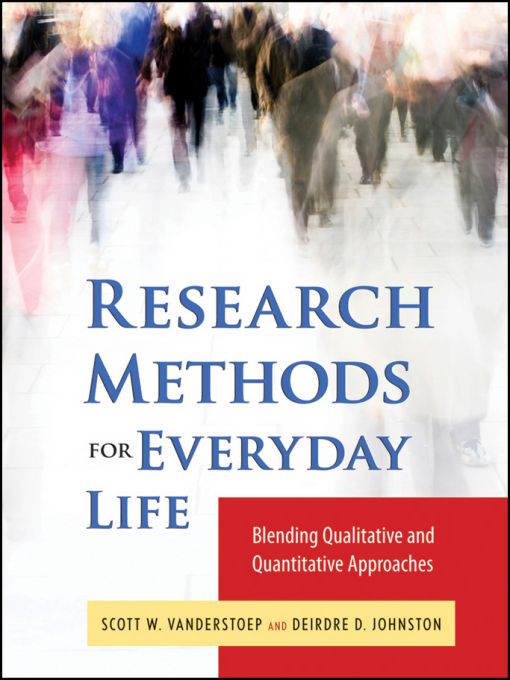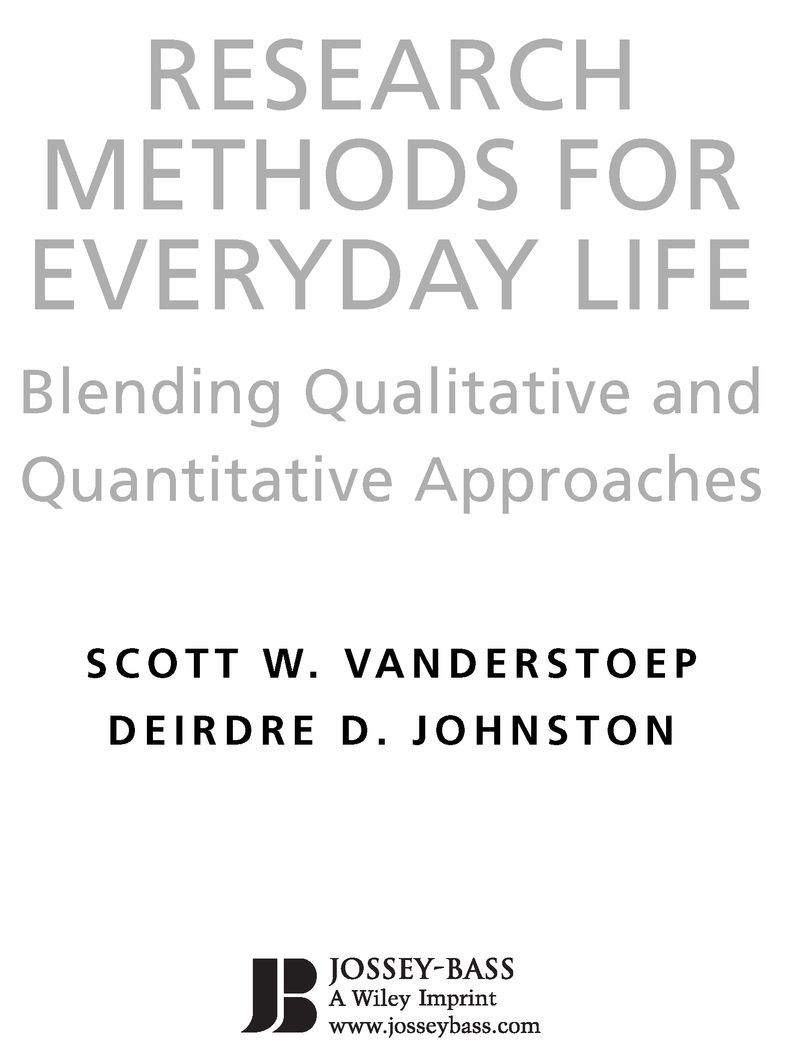Table of Contents
Table of Figures
List of Tables
Table of Exhibits
ABOUT THE AUTHORS
SCOTT W. VANDERSTOEP is Professor of Psychology, Chair of the Psychology Department, and Director of Academic Assessment at Hope College, Holland, Michigan. He has a PhD in education and psychology from the University of Michigan. He is published extensively in the area of college student learning and thinking. His recent research appears in Teaching of Psychology, Encyclopedia of Classroom Learning, and Journal of Educational Psychology. He is the author (with Paul Pintrich) of Learning to Learn: The Skill and Will of College Success, published by Prentice-Hall (2008), and the editor of Science and the Soul: Christian Faith and Psychological Research, published by University Press of America (2003). His current research focuses on the development of psychological profiles of young athletes who suffer from overuse injuries. He teaches courses in developmental psychology, psychology and religion, and advanced data analysis.
DEIRDRE D. JOHNSTON is Professor of Communication and Chair of the Communication Department at Hope College, Holland, Michigan. She has a PhD in communication studies from the University of Iowa. She is published extensively in the area of work-family research and was nominated for the 2005 and 2007 Rosabeth Moss Kanter Award for Excellence in Work-Family Research. Her most recent research appears in Sex Roles: A Journal of Research, Mass Communication and Society, Human Communication Research, and Sociological Focus. She is the author of The Art and Science of Persuasion, published by McGraw-Hill, and is currently working on a book entitled Global Communication Ethics: An Exploration of Nonviolent Communication and Sustained Dialogue in Cross-Cultural Engagement. She teaches courses in research methods, communication theory, intercultural and gender communication, and persuasion.
To our children
Amy, Mark, & Alli
Ellie & Anneka
PREFACE
Both of us came of age in our respective social science disciplines (VanderStoep in psychology and Johnston in communication) in an era when quantitative techniques dominated the research landscape. Both of us were well trained in experimental design and advanced statistical techniques. Although we still hold these research strategies in high regard, a new generation of social science students is learning an eclectic approach to social science methodology that includes both qualitative and quantitative methods. By the time you reach the end of this book, we hope you will feel comfortable attempting all of the methodologies we describe. Research can be intimidating, and some of the techniques we describe are complex. Even long-time researchers do not feel completely comfortable with all of the techniques in this book; instead, they specialize in certain techniques. Nonetheless, we believe the hands-on approach of this bookhighlighted mostly through the Your Turn activitieswill make you feel more comfortable with actually doing research as opposed to simply reading about it.

ACKNOWLEDGMENTS
At Hope College, we received support from our colleagues in the departments of psychology and communication, respectively. John Shaughnessy in Hopes Psychology Department was particularly helpful. As an author of an enduring research methods textbook, he was able to give keen insight and good counsel when it seemed like the project would never get finished. We are also particularly grateful to our long-time Dean of Social Sciences, Nancy Miller. She hired both of us at Hope College and provided extra encouragement for this project. She will retire in 2008 after serving as dean for 24 years.
We are also grateful to two of Hopes best students, Jessica Gartner and Anne Hoekstra. They read the entire manuscript from cover to cover and provided great feedback that only students can give. Their honesty kept us humble and made the book better. Our office managers, Linda Koetje from Communications and Kathy Adamski from Psychology, provided support for many aspects of the book, including reference checking, formatting, and preparation of the materials.
We were friends long before we were co-authors. Thus, our families have endured endless conversations at social gatherings regarding this book. Our children stay busy when our attention turns away from them and toward the pages of this book. Our spouses, Jill VanderStoep and Jim Dumerauf, balance their own professional lives and provide testimony to what it means to be great spouses.
We are grateful to Andy Pasternack at Jossey-Bass, who first met us through an unsolicited manuscript that was dropped off at his booth at the American Psychological Association. He was willing to take a chance on this project when other publishers were not. Associate Editor Seth Schwartz provided guidance in bringing the book to publication standards.
To all students or faculty who want to comment, correct, or suggest ideas for future editions, please contact us at vanderstoep@hope.edu or johnston@hope.edu.
Scott VanderStoep
Deirdre Johnston
INTRODUCTION
The purpose of this book is to help you become effective consumers and producers of research. We live in a world where the amount information available increases exponentially each year. One of the most important skills that you can bring to the workforce in the 21st century is the ability to interpret and evaluate existing data. In addition, the 21st-century workforce needs people who can produce valid and reliable data, accurately interpret trends and patterns, and summarize findings in a way that others can understand. We take the titleResearch Methods for Everyday Lifeseriously; we will introduce you to a variety of everyday examples that highlight the need to understand social science research.
This book will help you develop your quantitative and qualitative research techniques by exploring questions about human social behavior that will provoke your curiosity and connect with the experiences of your life. Throughout the book you will find real-life examples of practitioners using various research methodologies to answer questions in various lines of work, including psychology, sociology, education, business, political science, kinesiology, anthropology, and communication studies. You will also have the opportunity to engage in hands-on applications in which you actually do research. This is accomplished with numerous Your Turn boxes inserted in each chapter. The Your Turn exercises provide the opportunity to practice and apply the research methods and concepts presented in a chapter. The skills that you will practice during the exercises in the Your Turn boxes include sampling, naturalistic observation, surveying, coding, analysis, and report writing. In addition, you will have the opportunity to work with actual data and learn to analyze data statistically using SPSS (Statistical Package for the Social Sciences).
Research Methods for Everyday Life: Blending Qualitative and Quantitative Approaches is an introductory undergraduate text that highlights and explains the essentials of research methods. We focus on the essentials of research methods to help undergraduates understand and engage the research in their social science disciplines, to instruct students in conducting their own primary research, and to prepare students for advanced or graduate study. We reduce students anxiety about research methods by presenting the essentials of research in a way that is easy for students to read and understand. We include stories, examples, real-life applications, and skill-development exercises. We include the essentials necessary for a solid undergraduate grounding in research methods; however, we exclude advanced terminology, difficult theoretical issues, and complex data analysis procedures.


